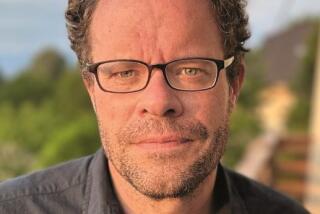In Search of Meaning in the Written Word
- Share via
Howard says he always knew “there was something missing.” Talking about it, however, can be awkward, so awkward in fact that Howard isn’t his real name.
Del Stelck had wanted to introduce me to Howard. Del, 76, is a retired Cal State Northridge history professor who lives not far from campus. Howard, 68, is a retired maintenance worker who lives in Pacoima. Once a week, Howard drops by Del’s house for a lesson.
Some retirees tackle a musical instrument or work on a college degree. Howard is learning to read.
I was hoping to meet Howard at Del’s house. Initially, Howard was enthusiastic about sharing his story, but then had second thoughts. “Oh, I used to be ashamed of it. It was painful. But I’m not ashamed of it any more,” he explained later. But the pseudonym, he says, may spare his children and grandchildren some of those awkward moments.
Imagine what it would be like to be unable to read--to rely solely on the spoken word and never on the written.
The statistics are squishy, but some authorities say that more than 1 in 5 adults in California are “functionally illiterate,” meaning they are unable to read above the 6th-grade level. When Howard started taking lessons three years ago, his abilities were much more rudimentary. The first textbook relies on illustrations to teach the phonics of consonants:
b--bird, bat, bag, bus
c-cup, cat, cap, car
d-dish, dog, duck, doll
The professor and the maintenance man became teacher and student, and now friends, through the Library Adult Reading Project (LARP), part of a 12-year-old federal program administered through public libraries. Cheryl Collins, who coordinates volunteers for the Los Angeles Public Library, says the program now has more than 400 volunteer instructors and 480 students citywide. The lessons all are one-on-one; some teachers have more than one student.
The students, Collins says, range in age from 18 to “a 102-year-old guy in South Central.” The vast majority, she says, are native-born Americans who, for whatever reasons, had inadequate education. In many cases, they may have been slowed by learning disabilities.
LARP is open to any English-speaking adult. Coordinators suspect many candidates aren’t aware of the program because they can’t read stories like this one and have largely succeeded in hiding their difficulty from other people.
It’s difficult for these adults to talk about, Collins says, “because it’s like saying that I’m stupid. And we know that’s not true because they do remarkable things.”
Collins and Sheila Weisberg, who coordinates the San Fernando Valley LARP efforts from the Mid-Valley Regional Library in North Hills, tell of students who have managed to operate successful businesses. Collins, who has worked as a LARP teacher, says her students even included a man who said he worked as a librarian.
It turned out he worked for a movie studio, maintaining a library of sound effects. He had worked out an elaborate color-coded and numbered filing system that he knew from memory. All transportation sounds would be filed under, say, red.
“This was a system he devised because he simply couldn’t write ‘car honking’ on a tape,” Collins says. “So it shows they may have a lot of skills, but reading is not one of them. . . . A lot of students have remarkable memories.”
Sly social skills help. Del Stelck remembers a student who had risen to a supervisorial position in the Veteran’s Administration. Whenever she had to give a report, she’d delegate the job to someone else and say she’d check their work later.
Howard says he managed to avoid embarrassment by changing the subject.
He was the youngest of seven children. Education wasn’t a priority when he was growing up in a small Texas town. But when Howard wasn’t struggling in school, his mother kept him busy with chores and earning money picking cotton in the fields. He stopped going to school after the sixth grade.
Howard says he always worked and stayed out of trouble. And he always had his faith. One reason he enrolled in LARP, he says, is that he wanted to learn to read the Scriptures.
At the Pacoima Library, Del Stelck started him with the basics, encouraging him along at his own pace. After the Northridge earthquake, they moved the lessons to Del’s house.
After Del suffered a stroke, the lessons were curtailed from twice to once weekly. Their sessions, supposed to last 90 minutes, often exceed two hours. Howard has also received tutoring from his 21-year-old granddaughter, a student at Cal State Northridge.
“Coming up, I knew there was something missing and there’s still something missing,” Howard says. “But I have progressed quite a bit.”
The man who started with basic phonics now reads short stories written in simple language. And he’s able to read some of the simpler passages of the Bible, too.
Just a start, he says. Whatever is missing, he plans to find it.
* Scott Harris’ column appears Tuesdays, Thursdays and Sundays. Readers may write to Harris at the Times Valley Edition, 20000 Prairie St., Chatsworth, CA 91311. Please include a phone number.
More to Read
Sign up for Essential California
The most important California stories and recommendations in your inbox every morning.
You may occasionally receive promotional content from the Los Angeles Times.













